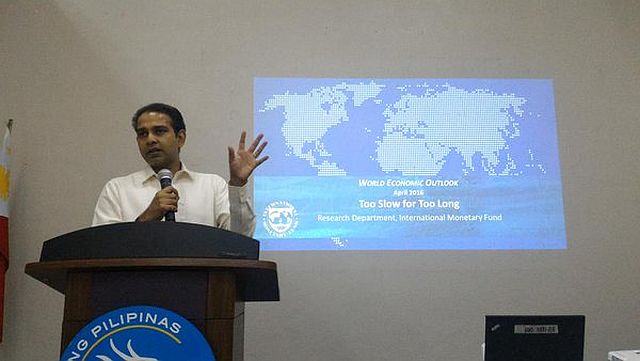IMF: Cut tax holidays, raise infra spending

PEIRIS
The Philippines is well-positioned to ride through the global economic slowdown but should maintain its prudent fiscal policy focusing on increased infrastructure spending to attract more investments, an International Monetary Fund (IMF) official said.
Shanaka Jayanath Peiris, IMF resident representative to the Philippines, said regardless of who wins in the May 9 presidential elections, government should continue to keep debt at a manageable level and raise revenues by broadening the tax base and reducing the loopholes in the tax collection system to be able to increase infrastructure spending.
The country’s current debt-to-GDP (gross domestic product) ratio is 45.4 percent while revenue-to-GDP ratio is around 15 percent, he said.
“You want to raise that by 2 to 3 percentage points, maybe up to 18 percent. If you do this and invest this to raise the public investment ratio to 5 to 6 percent, then you would be in a very good situation,” he added.
Raising the revenue-to-GDP ratio is not as easy as increasing the tax rates.
“Keep rates low or reform it, but cut the tax holidays and exemptions. Then use the revenues to spend more on infrastructure,” Peiris told reporters after presenting the World Economic Outlook at the Bangko Sentral ng Pilipinas regional office on Monday.
“What we are saying is reduce the exemptions. These are prone to problems. You are choosing to give (exemptions) to some people. It’s risky and more often, small and medium enterprises (SMEs) don’t benefit. It’s the big companies that get it,” he added.
By providing a more level playing field for SMEs, Peiris said the government would be able to collect more taxes and eventually lower the rates across the board.
Peiris said the Philippines should also allow foreign ownership to attract more investments, especially in public-private partnership (PPP) projects and undertake structural reforms to bring down shipping costs and the price of rice.
“All these tax exemptions are not enough to bring investments in. It’s the infrastructure and the regulatory framework that will matter,” he said.
IMF has trimmed its growth projection for the Philippines to 6 percent this year and 6.2 percent next year, the same rate projected for China also in 2017. The Philippine economy grew by 5.8 percent last year.
IMF also cut its growth projections for the global economy to 3.2 percent for this year and 3.5 percent next year as Japan is expected to go into recession next year because of a high debt level, China is seen to continue to slow down, and weak commodity prices will continue to impact on global investment and trade.
“Our focus is for a gradual (global) recovery, but there’s a high risk of stagnation and downside. We ran some simulations so that we will know what to do if it happens. But (a recession) is not what we expect right now,” he said.
On China, Peiris said the country would be in for a “desired slowdown.”
“It’s a good slowdown because China was investing too fast in the past few years so there’s overcapacity,” Peiris said.
The Philippines is not vulnerable to either the China slowdown or, in general, the moderate global economic growth, Peiris said.
He pointed out that the country is one of only three young countries of significant size and should take advantage of this demographic sweet spot. The other two countries with this advantage are India and Indonesia.
Compared to other emerging economies, Peiris said the Philippines is less exposed to China. A slowdown in China might affect the Philippines, but “not as much,” he added.
What the Philippines should watch out for is the potential rise in borrowing cost in emerging markets and the lower capital flows to these markets.
In his presentation, Peiris said many companies borrowed a lot when interest rates were low.
“A lot of that debt will fall due in 1 to 2 years in emerging markets. The risk of corporate (entities) being distressed is higher in emerging markets,” he said.
Aside from increasing infrastructure spending to attract more investments, Peiris said the Philippines should also ensure that the services sector remains strong to further drive economic growth.
Among the major growth drivers is the business process outsourcing (BPO) sector. Peiris added that remittances from overseas Filipino workers (OFW) also play a critical role because these create demand for services.
Disclaimer: The comments uploaded on this site do not necessarily represent or reflect the views of management and owner of Cebudailynews. We reserve the right to exclude comments that we deem to be inconsistent with our editorial standards.
